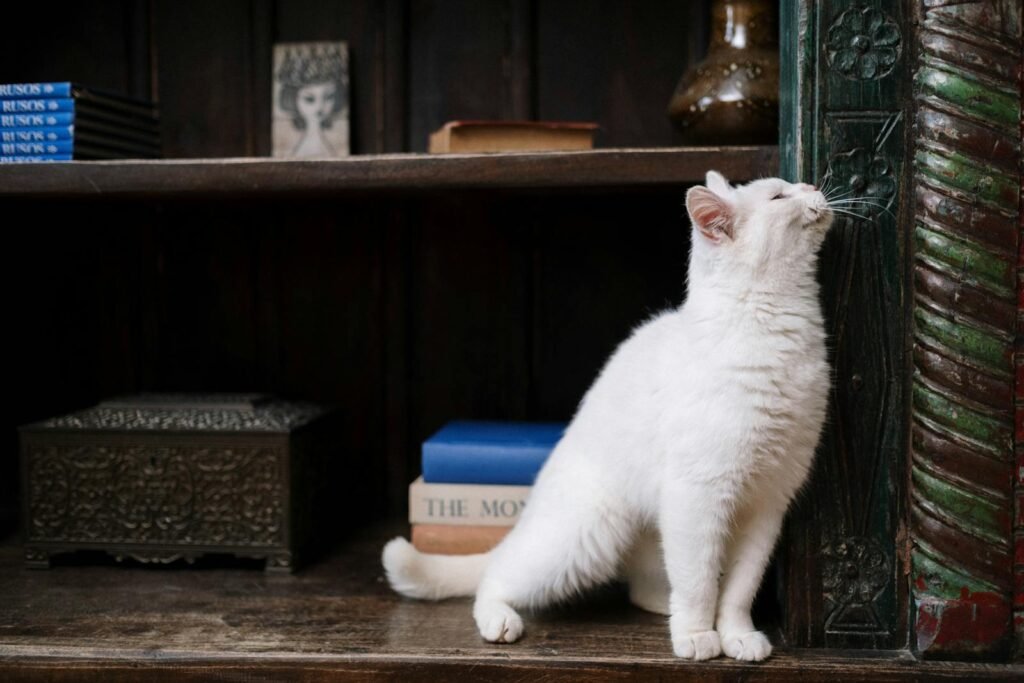Have you ever wondered if you’re actually the purr-fect cat parent? So many of us adore our whiskered companions, but even the most loving owners can slip up in ways that seem harmless but actually make a huge difference to our cats’ well-being. Some mistakes hide in plain sight, like a cat lurking under the bed—quiet, easy to miss, but surprisingly impactful. Let’s pull back the curtain and discover the nine mistakes cat owners make without even realizing, and how you can make life even better for your feline friend.
Not Providing Enough Mental Stimulation

Cats might look like they’re napping all day, but their minds are sharp and curious. A bored cat can quickly turn into a mischievous one, knocking things off shelves or scratching furniture just for something to do. Many owners don’t realize that cats need mental challenges, just like dogs or even kids. Simple toys, puzzle feeders, or even just a paper bag can provide hours of entertainment. Without these outlets, your cat might become stressed or even depressed. Even a window perch where they can watch birds outside can be a game-changer. Think of it like giving your cat its own little daily adventure.
Ignoring Dental Care

When was the last time you brushed your cat’s teeth? If you’re like most owners, the answer is probably never. Dental health often gets ignored, but it’s crucial for a cat’s overall health. Plaque and tartar build up quickly, leading to gum disease, painful infections, and even organ damage if left untreated. Bad breath isn’t just unpleasant—it’s a warning sign. Providing dental treats, regular vet check-ups, and introducing tooth brushing (yes, it’s possible!) can make a huge difference. Dental care often seems like an optional extra, but for cats, it’s a must.
Feeding an Inappropriate Diet

It’s tempting to buy the cheapest food or whatever’s on sale, but cats are obligate carnivores—they need a diet rich in animal protein. Many owners unknowingly feed their cats food that’s filled with fillers, grains, or low-quality meat by-products. Over time, this can lead to obesity, diabetes, or urinary tract issues. Reading ingredient labels and choosing food tailored to your cat’s age and health is vital. Resist the urge to overfeed or give too many treats, even when those pleading eyes beg you for more. A proper diet is the foundation of a long, healthy life.
Overlooking Regular Vet Visits

Many cat owners assume that if their pet seems healthy, there’s no need for a vet visit. But cats are masters of hiding pain and illness. Skipping annual check-ups means missing early signs of disease, dental problems, or even subtle changes in weight. Vaccinations, flea treatments, and bloodwork are all vital for keeping your cat healthy. Even indoor-only cats need regular vet care—they’re not immune to everything. Think of the vet as your cat’s health detective, catching problems before they become emergencies.
Failing to Cat-Proof the Home

Cats are curious by nature, and a home can be full of hidden dangers. Open windows, dangling cords, toxic houseplants, and human foods like onions or chocolate are just a few risks. Many owners don’t realize how quickly a cat can get into trouble—one leap onto a counter, and suddenly there’s a broken vase or worse. Take a walk through your home and look at it from a cat’s perspective; you might be surprised at what you find. Safety is about more than closing doors—it’s about removing temptation and hazards before your cat gets hurt.
Not Providing Vertical Space

Cats love to climb, perch, and survey their kingdom from above. Without shelves, cat trees, or tall furniture, your cat might feel confined or bored. Vertical territory isn’t just fun—it’s a way for cats to feel secure, especially if they share their home with other pets. Many fights or behavioral issues can be avoided by simply giving cats more places to escape or nap in peace. Even a few well-placed shelves or a tall scratching post can make your cat feel like royalty. Think of it as giving your cat its own private skyscraper.
Assuming All Cats Want the Same Things

Every cat is unique. Some love cuddles and playtime, while others prefer solitude and quiet. Owners sometimes make the mistake of treating all cats the same, expecting them to adapt. This can lead to stress, hiding, or even aggression. Pay attention to your cat’s body language and preferences. Maybe your lap cat loves being brushed, but your shy one prefers a quiet corner. Catering to your cat’s individual needs builds trust and makes for a much happier home.
Skipping Grooming Responsibilities

Long-haired or short-haired, every cat benefits from regular grooming. Owners often think cats groom themselves enough, but mats, hairballs, and loose fur can be a real problem. Regular brushing prevents tangles, reduces shedding, and strengthens the bond between you and your pet. Some cats need more help than others—Persians and Maine Coons, for example, require daily attention. Even short-haired cats appreciate a good brushing, and it’s a great chance to check for lumps, bumps, or parasites.
Misunderstanding Cat Body Language

Cats speak volumes with their tails, ears, and eyes, but owners often miss the message. A wagging tail doesn’t mean happiness—it usually means irritation. Flattened ears signal fear or aggression, while slow blinks are a sign of trust. Misreading these cues can lead to accidental bites or scratches, or simply a stressed and unhappy cat. Take time to observe your cat and learn its unique “language.” It’s like learning to dance together—one wrong step can throw off the rhythm, but when you’re in sync, it’s magical.
Leaving Cats Alone for Too Long

Cats have a reputation for being independent, but that doesn’t mean they don’t get lonely. Leaving a cat alone for days with just a big bowl of food and water can cause anxiety, boredom, or even health issues. Cats crave interaction and routine, and many thrive on human company. If you travel often, consider a pet sitter or a trusted friend to check in. Even daily play sessions or talking to your cat before work can make a world of difference. Remember, to your cat, you are the center of their universe.
Forgetting About Playtime

A tired cat is a happy cat, but many owners assume their pet will play on its own. Structured play with wands, balls, or laser pointers not only provides exercise but also strengthens your bond. Without enough play, cats can develop destructive habits or gain too much weight. Playtime mimics hunting and keeps their bodies and minds sharp. Just ten minutes a day can turn a grumpy cat into a contented one. Ask any cat lover—there’s nothing more rewarding than seeing your cat pounce with joy.
Not Respecting a Cat’s Personal Space

It’s hard to resist picking up your cat or smothering it with kisses, but sometimes cats just want to be left alone. Ignoring their signals can make them anxious or even lead to aggression. Watch for dilated pupils, a flicking tail, or a twitching back—these are signs your cat needs a break. Respect goes both ways: give your cat a safe retreat, like a cozy bed or a high shelf, where they can relax undisturbed. Trust builds when you let your cat come to you on its own terms.
Allowing the Cat Outdoors Unsafely

Open doors can tempt a curious cat, but outside is full of dangers: cars, predators, diseases, and even toxic plants. Many owners think letting their cat roam is natural, but it often leads to injury or a much shorter life. If your cat craves adventure, consider a secure catio, leash training, or supervised outdoor time. Indoor cats live longer, healthier lives, but it’s possible to give them safe tastes of the wild, too. Think of it as letting your cat have the best of both worlds.
Not Spaying or Neutering at the Right Time

Some owners delay spaying or neutering, thinking it’s unnecessary, or worry about the surgery. But unaltered cats can develop health and behavioral issues, like spraying, yowling, or even certain cancers. Overpopulation is a massive problem—one unplanned litter can add to the millions of homeless cats worldwide. Vets now recommend spaying or neutering by six months of age, or even earlier in some cases. The benefits far outweigh the brief discomfort, and your cat will thank you in the long run.
Assuming Indoor Cats Don’t Need Parasite Prevention

It’s easy to assume that an indoor cat is safe from fleas, ticks, or worms, but these pests can hitch a ride on your clothes or slip in through screens. Many owners forget to use preventive treatments, leaving their cats vulnerable. A few itchy bites can turn into a full-blown infestation fast. Regular vet-recommended medications keep your cat protected, and a routine check for signs of itching, hair loss, or scooting is wise. Peace of mind is worth the extra effort.
Overlooking Changes in Behavior

Cats are creatures of habit. If your normally social cat starts hiding, or your playful kitten suddenly sleeps all day, it could mean something is wrong. Owners often chalk these changes up to moodiness or aging, but they’re often the first signs of illness or stress. Keep an eye out for changes in appetite, litter box habits, or vocalizations. Trust your instincts—if something feels off, call your vet. Early intervention can be life-saving.
Using Punishment Instead of Positive Reinforcement

When a cat scratches the couch or jumps on the table, it’s tempting to scold or squirt water. But punishment only creates fear and confusion. Cats don’t connect the punishment with their behavior; instead, they might just learn to avoid you. Positive reinforcement—rewarding good behavior with treats or affection—is far more effective. Redirect unwanted actions gently and reward the right choices. The goal isn’t to control your cat, but to guide it toward happier, healthier habits.
Failing to Create a Predictable Routine

Cats thrive on routine. Sudden changes in feeding times, litter box cleaning, or even your own schedule can create anxiety. Owners sometimes forget just how much comfort a predictable day provides. Try to feed, play, and clean at the same times each day. Small rituals—like a morning cuddle or evening game—help your cat feel safe and secure. When life gets chaotic, your cat will always know what to expect from you. Consistency is the secret ingredient to a peaceful cat household.

Linnea is a born and bred Swede but spends as much time as possible in Cape Town, South Africa. This is mainly due to Cape Town’s extraordinary scenery, wildlife, and atmosphere (in other words, because Cape Town is heaven on earth.) That being said, Sweden’s majestic forests forever hold a special place in her heart. Linnea spends as much time as she can close to the ocean collecting sea shells or in the park admiring puppies.






